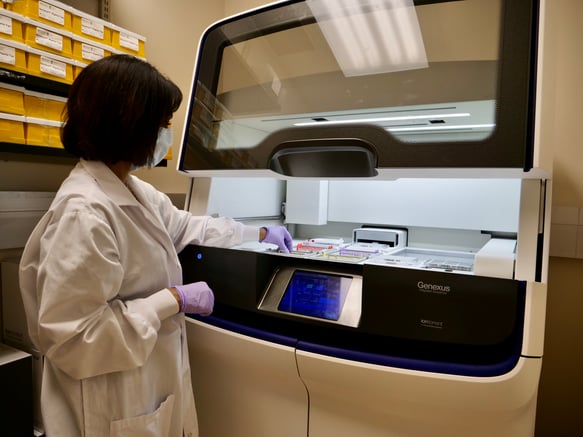Next-generation sequencing (NGS) technology has changed cancer treatment by enabling pathologists and oncologists to match cancer patients with targeted therapies based on a tumor’s genetic profile. Yet not every cancer patient has access to this transformative technology.
Most cancer patients are treated in community hospitals that often rely on less comprehensive single-gene testing which can be inefficient and require larger, additional sample tissue, or they outsource patient samples to centralized labs for comprehensive sequencing, which can delay turnaround times by weeks.
“As the number of targeted therapies and actionable biomarkers grows, NGS is an increasingly necessary standard of care in modern oncology,”
This reliance on outsourced comprehensive testing or in-house single-gene testing is starting to change, however, with community hospitals turning to new automated technology to bring NGS in-house, thus opening the door to precision medicine for more patients. Pathologist Dr. Brandon Sheffield spearheaded the campaign to insource NGS at William Osler Health System in Brampton, Ontario. His goal: ensure more patients have access to comprehensive biomarker data during their first oncology visit – enabling oncologists to match them with the right treatment right away.

Dr. Brandon Sheffield
Physician Lead of Research, Medical Director of Immunohistochemistry and Molecular Pathology
William Osler Health System
“As the number of targeted therapies and actionable biomarkers grows, NGS is an increasingly necessary standard of care in modern oncology,” Dr. Sheffield wrote in a recent article for The Pathologist. Before bringing NGS in-house, Osler already boasted impressive turnaround times for its single-biomarker testing program. For some cancers, however, the hospital was running multiple tests and still not seeing a complete picture.
Osler adopted the fully-automated Ion Torrent Genexus System to expand the number of biomarkers the hospital could analyze with just one test. Dr. Sheffield’s team chose the Genexus System because of its integrated workflow, enabling the hospital’s histotechnologists to easily operate the instrument and limiting the need for additional staffing and training.

The fully automated workflow is helping NGS reach its true potential in the healthcare setting, says Dr. Sheffield. “Combining all the necessary steps into a single instrument means the technology can be placed in a local pathology lab – enabling comprehensive biomarker testing in a substantially reduced timeframe and with ongoing cost savings.”
Community hospitals face a unique set of challenges – including limited staff, budget and resources – that have, until now, hindered their ability to offer comprehensive molecular profiling to patients. But case studies such as Osler show it’s now possible to broaden the use of this technology outside of academic medical centers.
To read more about Dr. Sheffield’s experience bringing NGS in-house, read his recent article in The Pathologist.
Learn more about the Ion Torrent Genexus System.
For Research Use Only. Not for use in diagnostic procedures.
Next-generation sequencing (NGS) technology has changed cancer treatment by enabling pathologists and oncologists to match cancer patients with targeted therapies based on a tumor’s genetic profile. Yet not every cancer patient has access to this...